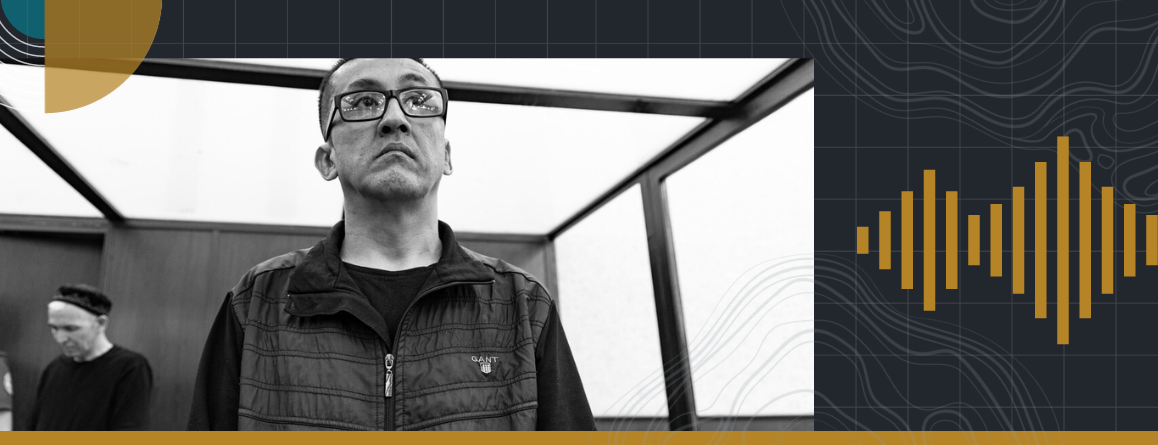Karakalpak lawyer, Human Rights Defender and political prisoner Tajimuratov’s mother visited him on July 30, 2024 – August 01, 2024 in the high-security colony KIN 11 in the city of Navoi, where he is serving his 16-year prison sentence. Dauletmurat Tajimuratov lives in a barrack with 150 other prisoners, suffering from inhumane living conditions and lack of access to clean and safe drinking water. We have been repeatedly reporting that Dauletmurat Tajimuratov is being tortured, bullied, and threatened by the leadership of KIN11.
According to his mother, within a month he has lost at least ten kilograms of weight, moves with difficulty, and during three-day visit he has not been able to eat anything due to non-stop nausea and vomiting.
The deterioration of Tajimuratov’s condition is attributed to the terrible conditions of compulsory labor for prisoners. Tajimuratov works in a lime production shop without protective clothing or a mask, showing clear signs of lime dust poisoning. He has ulcers on his feet, hands, and lips due to working barefoot in flip-flops and without gloves and respirators.
Scientific reports state that if swallowed lime (Calcium Oxide) can produce chemical burns within the oral cavity and gastrointestinal tract following ingestion. Exposure to eyes can result in chemical burns to the eye and causes severe eye damage. Vapors or mists may be extremely irritating. The material can produce chemical burns following direct contact with the skin. The material may produce health damage following entry through wounds, lesions or abrasions. Solution of material in moisture on the skin, or perspiration, may markedly increase skin corrosion and accelerate tissue destruction. Entry into the blood-stream, through, for example, cuts, abrasions or lesions, may produce systemic injury with harmful effects. If inhaled, this material can irritate the throat and lungs. Inhalation of calcium oxide may produce inflammation of the respiratory passages and ulceration and perforation of the septum. Repeated or prolonged exposure to corrosives may result in the erosion of teeth, inflammatory and ulcerative changes in the mouth and necrosis of the jaw. Bronchial irritation, with cough, and frequent attacks of bronchial pneumonia may ensue. Available evidence suggests that repeated or long-term occupational exposure may produce cumulative health effects involving organs or biochemical systems. Long term exposure to high dust concentrations may cause changes in lung function i.e. pneumoconiosis; caused by particles penetrating and remaining in the lung.
International Labour Organization (ILO) states that repeated or prolonged contact with skin may cause dermatitis. Repeated or prolonged inhalation of dust particles may cause effects on the lungs. Repeated or prolonged inhalation may cause nasal ulceration. This may result in perforation of the nasal septum. Harmful concentration of airborne particles can be reached quickly when dispersed. The substance can be absorbed into the body by inhalation of its aerosol and by ingestion. The substance is corrosive to the eyes, skin and respiratory tract. The effects may be delayed. Medical observation is indicated.
ILO further states: If inhaled the symptoms include burning sensation, cough, shortness of breath, sore throat. Exposure to the skins results in dry skin, redness, skin burns, burning sensation, pain. Exposure to the eye results in redness, pain, blurred vision, severe deep burns. If ingested it results in burning sensation, abdominal pain, abdominal cramps, vomiting, diarrhoea.
ILO prevention requirements demand using an exhaust and breathing protection, protecting gloves, protective clothing, safety goggles or eye protection.
ILO prohibits drinking during work. It is, however, difficult to abstain from drinking in intense Uzbekistan heat and it is unknown if the work conditions in prison lime production shop provide a possibility for prisoners such as Dauletmurat Tajimuratov to drink away from the lime production location to avoid ingesting the dust particles with the water.
In all of the cases of exposure to the hazardous material ILO recommends medical attention. This is exactly what Dauletmurat Tajimuratov is being now denied.
On July 27, due to his worsening health condition, Dauletmurat was hospitalized for two days and received a single injection of an unknown medicament, but no proper medical testing and treatment for toxic poisoning. Dauletmurat is experiencing all of the symptoms of lime dust poisoning, including coughing, difficulty breathing, shortness of breath, chemical burns to skin and mucous membrane, eye pain and burning, dizziness, nausea and vomiting.
Lime poisoning is a life-threatening condition if left unaddressed along with continued exposure. Freedom for Eurasia and the Dauletmurat Tajimuratov’s family are concerned about his health and life. We urge the international community and human rights organizations to raise the current situation of Dauletmurat Tajimuratov with Uzbekistan authorities and advocate for his immediate release, right to life, safety, access to proper healthcare, and adequate and safe work conditions in prison.
